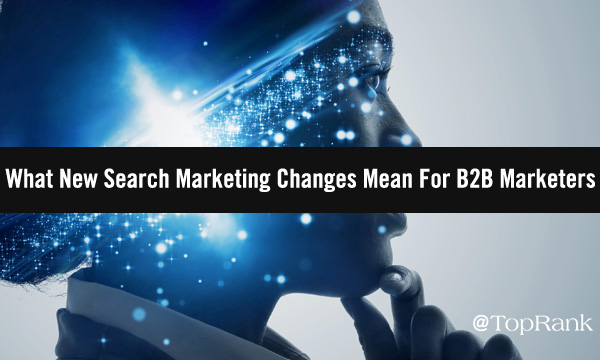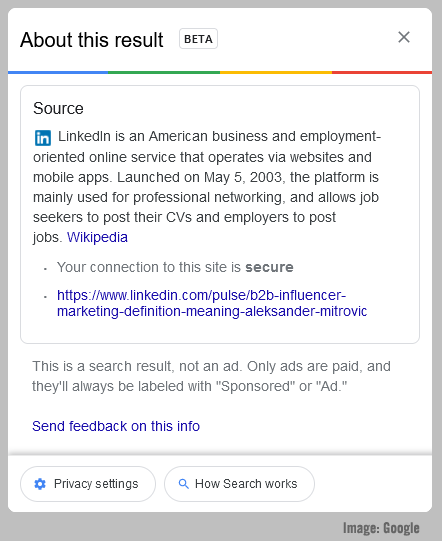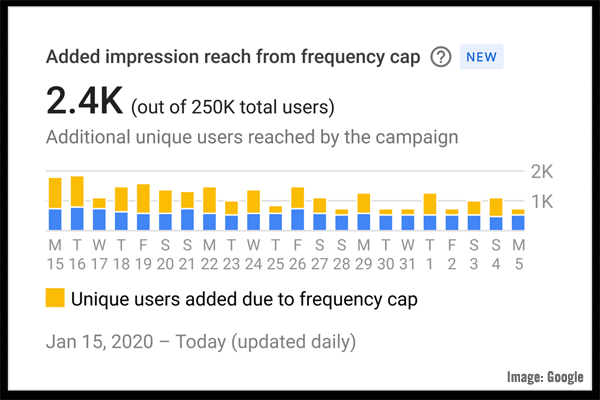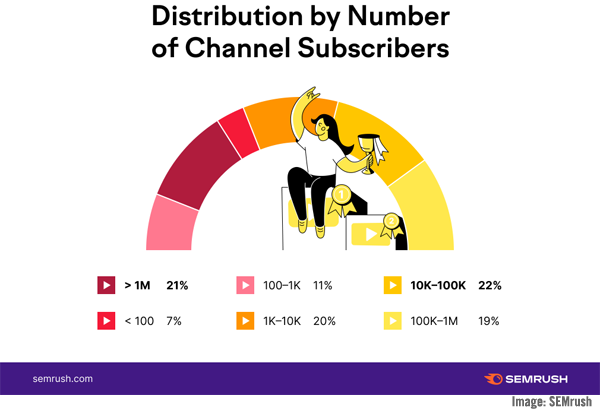
 How can B2B marketers adapt to the latest changes in search engine marketing? Google, Bing, and other search engines have continued to refine their services, bringing changes that B2B marketers need to be aware of. Holding the dual roles of the world’s most popular search engine and its biggest search advertising provider, Google and its parent company Alphabet saw an especially strong 70 percent increase in advertising revenue during the second quarter of 2021, the firms recently disclosed. That equates to some $560 million is advertising revenue per day during the quarter, and a year-over-year increase of 62 percent, rebounding from the firm’s only revenue decline a year ago due to the global health crisis. Search advertising revenue alone rose by 68 percent and accounted for some $38.8 billion during the reporting period, making it as clear as ever that paid search ads continue to be used as an important part of the marketing strategies of both B2C and B2B firms. The recently-released 2020-2021 edition of the ACSI (American Customer Satisfaction Index) shows some of the reasons why Google’s search remains essentially a de-facto element in marketing efforts, and reinforces Google’s continuing dominance, topping the customer experience list with a score of 76 out of 100. Microsoft’s Bing wasn’t far behind Google in the index rating, however, with a customer experience score of 71. Let’s take a look at five of the most recent changes among Google and Bing that are likely to affect B2B marketers, and how they may play out as we push ahead towards 2022.
How can B2B marketers adapt to the latest changes in search engine marketing? Google, Bing, and other search engines have continued to refine their services, bringing changes that B2B marketers need to be aware of. Holding the dual roles of the world’s most popular search engine and its biggest search advertising provider, Google and its parent company Alphabet saw an especially strong 70 percent increase in advertising revenue during the second quarter of 2021, the firms recently disclosed. That equates to some $560 million is advertising revenue per day during the quarter, and a year-over-year increase of 62 percent, rebounding from the firm’s only revenue decline a year ago due to the global health crisis. Search advertising revenue alone rose by 68 percent and accounted for some $38.8 billion during the reporting period, making it as clear as ever that paid search ads continue to be used as an important part of the marketing strategies of both B2C and B2B firms. The recently-released 2020-2021 edition of the ACSI (American Customer Satisfaction Index) shows some of the reasons why Google’s search remains essentially a de-facto element in marketing efforts, and reinforces Google’s continuing dominance, topping the customer experience list with a score of 76 out of 100. Microsoft’s Bing wasn’t far behind Google in the index rating, however, with a customer experience score of 71. Let’s take a look at five of the most recent changes among Google and Bing that are likely to affect B2B marketers, and how they may play out as we push ahead towards 2022.
1 — Google’s "About This Result" & Feedback Features
Google recently introduced a new search feature that now shows some of the reasons why it ranked a specific search result in the position it was discovered, via the three dot additional options section to the right of most search results. This new list of certain factors taken into account by Google for individual search results launched in late July, and reveals information that can include:- Matching Keywords
- Related Terms
- Looking-at Links
- Local Relevance
 The “looking at links” information shows, according to Google, “When other pages link to a page using similar words as your query, that page might be relevant to your search. It can also be a helpful indicator of whether online content creators tend to regard the page as useful for that topic.” The option to send feedback to Google on a particular SERP entry may also offer B2B marketers a route to providing additional insight about an indexed page — or perhaps even on competitor pages, as was discussed on the WebmasterWorld message forums. Some search results shown through the new panel also include the ability to perform a similar results search, offering more insight on which pages Google’s search index and algorithms consider as holding similar value or information. Other results include underlined words that can be hovered over to show a selection of search tips meant to refine a particular search — another potentially helpful feature for marketers. While offering only limited information to marketers, what is available can still be used to refine and improve existing page search engine optimization (SEO) efforts.
The “looking at links” information shows, according to Google, “When other pages link to a page using similar words as your query, that page might be relevant to your search. It can also be a helpful indicator of whether online content creators tend to regard the page as useful for that topic.” The option to send feedback to Google on a particular SERP entry may also offer B2B marketers a route to providing additional insight about an indexed page — or perhaps even on competitor pages, as was discussed on the WebmasterWorld message forums. Some search results shown through the new panel also include the ability to perform a similar results search, offering more insight on which pages Google’s search index and algorithms consider as holding similar value or information. Other results include underlined words that can be hovered over to show a selection of search tips meant to refine a particular search — another potentially helpful feature for marketers. While offering only limited information to marketers, what is available can still be used to refine and improve existing page search engine optimization (SEO) efforts.
2 — Display & Video 360 Bring New Google Data Insights
Google has also recently added an array of new visual overview data to its Display & Video 360 enterprise advertising and analytics platform, in a change that is set to smooth the job of marketers using the product across various channels. The new views offer a real-time glimpse of reach — gleaned partially from DV360’s log data — when it comes to a campaign’s performance, and should also make it easier to find the highest performing programmatic advertising campaigns, including video. Video has only become more important to B2B brands during the global health crisis, and recent Hubspot data shows that 72 percent of customers prefer to learn about a product or service from video content. The functionality of Google’s YouTube as a search engine for both B2C and B2B queries is also an important part of today’s marketing considerations, with recently-released study data from SEMrush showing that even smaller YouTube channels can still produce content that places among the top search results on the platform.
The new views offer a real-time glimpse of reach — gleaned partially from DV360’s log data — when it comes to a campaign’s performance, and should also make it easier to find the highest performing programmatic advertising campaigns, including video. Video has only become more important to B2B brands during the global health crisis, and recent Hubspot data shows that 72 percent of customers prefer to learn about a product or service from video content. The functionality of Google’s YouTube as a search engine for both B2C and B2B queries is also an important part of today’s marketing considerations, with recently-released study data from SEMrush showing that even smaller YouTube channels can still produce content that places among the top search results on the platform. 
3 — Learning More With Google Discover
As more B2B brands than ever fall into today’s expanding publisher category, some marketers are increasingly turning to more niche and specialized Google products for fine-tuning their SEO efforts. One of these is Google Discover, the search giant’s personalized Android-only mobile offering, has been tricky to specifically target with optimization efforts, however recent insight has come from several marketers and SEO professionals, including Lily Ray and her “Google Discover: 10 Characteristics of Top-Performing Content” study. Perhaps currently overlooked by the majority of B2B marketers, devoting SEO efforts to Google Discover can nonetheless be worthwhile, Ray noted. “Performing well in Google Discover will likely stem from a content strategy mimicking that used on other social platforms, rather than a keyword-research-driven, E-A-T focused SEO strategy,” Ray said. Ray was one of the 12 top industry experts featured in our annual trends and predictions article, “12 Top B2B SEO Trends & Predictions for 2021.” [bctt tweet="The biggest overarching trend in SEO in recent years which will undoubtedly continue in 2021 is the focus on E-A-T: expertise, authoritativeness, and trustworthiness. — Lily Ray @lilyraynyc" username="toprank"]4 — Google TensorFlow Ranking Updates
Despite its well-entrenched position as the world’s leading search engine and search advertising provider, Google has developed framework adjustments that aim to allow it to more quickly implement any manner of algorithmic and search ranking improvements. Front and center of this push are Google’s recent TensorFlow Ranking changes, that affect how swiftly new search technology is able to be tested and rolled out to the public. Long-time search industry professional Roger Montti — another of the subject matter experts featured in our annual SEO predictions article — examines many of the technical details surrounding Google’s latest TensorFlow Ranking features in “Google’s New Technology Helps Create Powerful Ranking-Algorithms.” These types of changes that allow Google to quickly try out new things can represent an underutilized opportunity for savvy B2B marketers looking for detail-oriented advantages that more slowly-moving brands may not be able to react fast enough to take part in and learn from. [bctt tweet="SEO is so consumed with SEO rituals, optimizing for Google, that it forgets that the end game to all of these shenanigans is increasing sales. — Roger Montti @martinibuster" username="toprank"]5 — Bing’s New Chat & Related Image Features
Microsoft’s Bing search engine also continues to innovate and implement a variety of new features as it has evolved over the years. One experimental new change has been the introduction of artificial intelligence (AI) backed interactive chat features within Bing’s search results, bringing a new level of interactivity to SERP content that could also offer future optimization opportunities for B2B marketers. While currently only a limited test, Bing’s chatbot feature represents a shift that’s been happening over the past five years, to content that’s more interactive. 33 percent of members of the global CMO Coucil recently said that they plan to upgrade digital interactive marketing efforts during 2021, as we reported. Bing has also recently rolled out a search feature that makes it easier to view images related to particular search results, offering a pop-up that displays an array of additional images from the site hosting the SERP entry. Visual search optimization has grown in importance, and changes such as Bing’s recent carousel of related images from the site of origin highlight some of the lesser-known gains that B2B marketers can achieve in the area.Ratchet Up Your B2B Search Marketing
via GIPHY B2B marketing doesn’t have to be a conveyor belt of boring content efforts when you spice up your efforts by incorporating the latest search marketing news, tactics, and tips from Google and Bing that we’ve explored here. By implementing the items we've dug into, from Google’s "About This Result" and feedback features to its new Display & Video 360 data insights, Google Discover, TensorFlow ranking updates, and Bing SERP chatbot and related-image features, we hope you'll come away with new ideas and inspiration as we make the drive ahead towards successful B2B marketing efforts in 2022 and beyond. Crafting award-winning digital search experiences featuring elements such as these takes significant time, resources, and effort, which is why many of the world’s top B2B brands choose to partner with a leading B2B marketing agency. Contact us today and learn why for more than 20 years brands from LinkedIn and 3M to Dell and Adobe have chosen to work with TopRank Marketing.The post What 5 Recent Search Marketing Changes Mean For B2B Marketers appeared first on B2B Marketing Blog - TopRank®.
Article Source: http://bathseoexpert.blogspot.com/2021/08/what-5-recent-search-marketing-changes.html
No comments:
Post a Comment